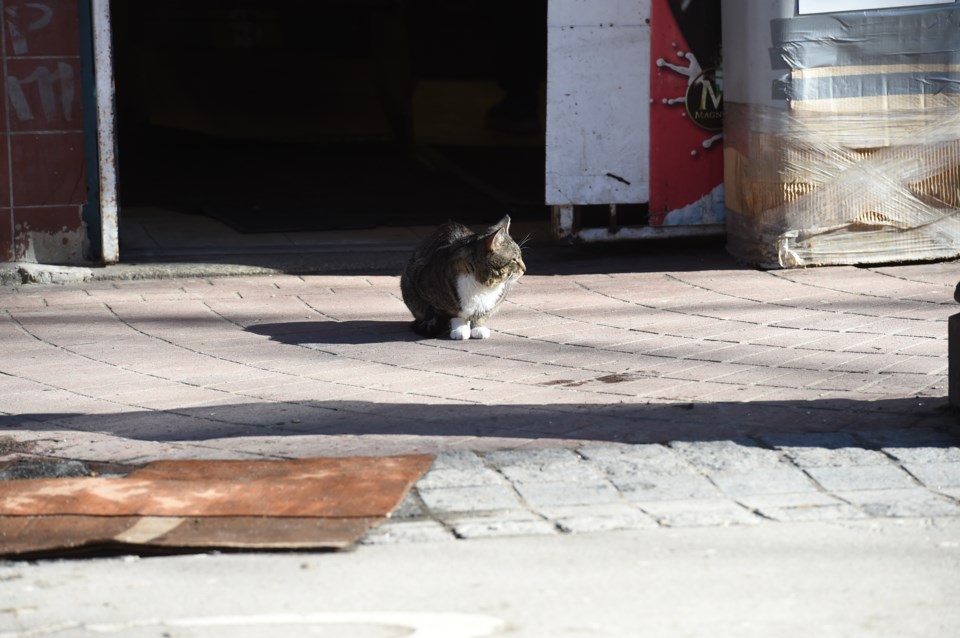There has long been debate over the ethics of keeping animals indoors. It's well-established that dogs need to be taken for walks but the guidelines surrounding cats are a bit more ambiguous and open to interpretation.
Some people feel strongly about letting cats roam freely, others feel the opposite. Certain adoption agencies won't let you adopt a cat unless you promise to keep it as an indoor-only pet.
Vancouver Orphan Kitten Rescue Association (VOKRA) has had a policy in place since it started 23 years ago, in response to the huge number of kittens being turned in to the Vancouver SPCA.
"Once we started working with the [kittens], we realized they were all mainly coming from one swath of Vancouver, where there were tons of rentals and low income," says co-founder Karen Duncan. "We began trapping all the adults and getting them fixed. Then, if not tame, they went back to where they were being fed."
There were huge colonies of up to 40 cats breeding in the area she recalls, and the large number began attracting coyotes.
"We were seeing what happened to cats who were allowed to go outside," says Duncan. "Between cars, nasty people, coyotes, raccoons, and poison in rats and mice."
There are still many things that can harm or even kill cats on the street, so VOKRA encourages enclosed catios (cat-patios) and pair adoptions so that cats get enrichment without being put in danger.
"When I look back at my childhood, dogs were often allowed to roam and fight and breed on the streets," says Duncan. "Now, if we see a dog without someone it is known that something needs to be done. We hope that things will continue toward cats being indoors. You do not want to see what we see, it is heartbreaking."
There is a growing trend of walking cats with a harness but Duncan warns that VOKRA gets a lot of calls from owners whose cat got scared and bolted while out on a walk.
Cats can get spooked by dogs, drones, cars, and other people in a new environment. "They get out of the halter and are gone," she says. "Sometimes we find them, but mostly, parts of the cats are found." Duncan reminds people that cats are not like dogs, "they do not want to go and socialize and be out meeting animals and people."
What is the BC SPCA's official stance?
The City of Vancouver doesn't have any bylaws in place that require cats to be kept indoors, but it does encourage responsible pet ownership, which requires ensuring the safety of a pet at all times, regardless of if it's indoor or outdoor. Dogs are required to be licensed, and it's illegal to tie a dog to a lamppost or bike rack on the street, but there isn't much information available on cats.
The BC SPCA believes that cats are "undervalued by society and born in numbers that far exceed available homes," according to its website. The BC SPCA's policy requires that cat owners provide the "five freedoms" and balance the behavioural needs of cats with the protection of wildlife.
"Most cats can experience good welfare indoors in an environment that minimizes stressful stimuli and offers species-specific enrichment," reads the website. But "controlled outdoor access can provide additional enrichment and protection from health and safety risks outside such as disease, predation and vehicles while preventing harm to wild animals."
Spaying and neutering cats also helps to reduce overpopulation if you intend to let your cat go outside.
Outdoor cats usually fall somewhere along a spectrum of socialization, from friendly to feral, and ownership, from owned or semi-owned to unowned and wild.
There are also varying levels of confinement such as completely free-roaming, semi-wild barn cats, and mostly indoor cats who occasionally go in the garden. The acceptability of outdoor cats is dependent on the environment and context a lot of the time. Is the area urban and densely populated like Vancouver or is it rural?
"While poor welfare in outdoor environments is not a given," says the BC SPCA, "risks that cats face outside include attacks and predation by wild animals, fights with other cats, collisions with vehicles, diseases and parasites, frostbite and exposure to toxins."
In addition, cats are also a significant predator of birds, mammals and other small wildlife.
The BC SPCA assesses how a cat fits into each category before passing judgment.
Punitive approaches such as fines can disproportionately impact vulnerable cat owners who struggle to afford or access services and they are more likely to be separated from their animals.
The BC SPCA focuses on education and advocacy for increased availability and affordability of pet-friendly housing. Plus, trap-neuter-return programs for free-roaming cats. The organization will sometimes relocate colonies that are threatening ecologically sensitive areas and employ exclusion techniques to stop new colonies from moving in.
How to provide a good life for an indoor cat
The ideal indoor environment for a cat should include space for toileting, playing, resting and sleeping, places for hiding, perching and scratching, and comfortable temperatures and low noise levels according to the BC SPCA guidelines.
They do approve of leash walks and catios that prevent cats from preying on wildlife and encourage mental enrichment like puzzle feeders and toys to prevent boredom and frustration.
Cats are social and can benefit from the company of other cats, especially siblings but multi-cat households should pay attention to the number and distribution of resources, including food, water, litter boxes, scratching posts, and perching and hiding spots, to minimize competition and stress, advises the website.



